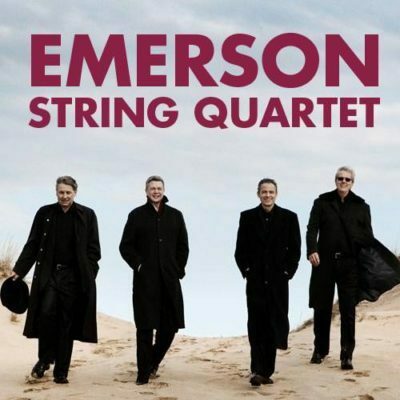Emerson String Quartet at Ravinia Festival
Eugene Drucker, Violin
Philip Setzer, Violin
Lawrence Dutton, Viola
Paul Watkins, Cello
Beethoven: Quartet No. 14 in C-sharp Minor, Op. 131
Schubert: Quartet No. 14 in D Minor, D. 810 (“Death and the Maiden”)
The venerable Emerson String Quartet opened their Monday-night program at Ravinia with what is arguably the greatest piece for string-quartet by the greatest master of the genre. Op. 131 is part of the series of five quartets that together represent Beethoven’s last major achievement – he was dead within a year of its 1826 completion. Composed in seven movements instead of the usual four, it is perhaps the most ambitious attempt to create a string quartet of symphonic sweep, and the result is at once dazzling and overwhelming: by turns melancholy, mischievous, serene, and tragic. If one can follow the many diverse threads brought together over the course of these seven movements, it is an experience not quite like any other.
The Emersons offered a generally vigorous performance of this enigmatic yet rewarding work, although I must quibble over certain points. In the slow fugue that serves as the first movement – in the spirit of Bach but with a tinge of romanticism, believed by Wagner, not without justification, to be the most melancholy of all music up to his time – greater clarity and fluency of individual lines would have yielded more impact, both emotional and musical. While Beethoven provides much material for all four quartet-parts throughout the piece – with that for the viola coming off as especially prominent in this performance, the Emerson’s violist, Lawrence Dutton, striking me as in many ways this ensemble’s finest player – the first-violin part is significant enough that it ought to hold its own against the other three. Here, that did not quite happen, in large part due to the often somewhat tentative first violin of Philip Setzer. This would have been a more striking performance if his playing had been more assertive and rich. There was also some surprisingly insecure intonation, especially in the rambunctious fifth-movement Presto, although this hardly detracted from the performance as a whole.
Yet there were memorable moments as well: the cello of Paul Watkins (the newest member of the quartet, having replaced long-time cellist David Finckel last year) sang beautifully in the lyrical second variation of the central Andante movement, as in the dialogue between cello and viola in that movement’s third variation. The ensemble is capable of great vehemence in dramatic passages, often to fine effect, and brought the work to a most satisfying conclusion with a robust and determined reading of the tragic Finale. An enjoyable performance overall, in spite of my previous criticisms as well as their (to my ears) somewhat edgy tone, which would benefit from greater warmth.
The Emerson Quartet is in the unusual habit of alternating the first- and second-violin parts between its two violinists, and Mr. Setzer’s colleague Eugene Drucker took the first violin’s chair in the concluding Schubert “Death and the Maiden” Quartet. I regretted that Mr. Drucker did not lead the ensemble during the Beethoven as well, for his playing had, in addition to elegance, all the power I missed in Mr. Setzer’s playing in the Beethoven; this was a particular asset in the touching slow movement, a series of variations on Schubert’s earlier song after which the whole piece has come to be called. This seating change rendered the performance more consistently satisfying and impactful than that of the Beethoven, and it was on the whole quite a success. Besides the concern about their tone-quality as noted above, my only complaint is that the first movement could have been somewhat less aggressive and more lyrical.
In some ways, the highlight of the evening was the encore, which consisted of the slow movement from Haydn’s Quartet Op. 20 No. 3. Here, Mr. Setzer once again served as the first violinist, but in spite of being a bit underpowered, he played with a convincing sense of lyricism, as did his three colleagues, making for a naturally musical, even heartfelt, performance and ending the already satisfying program on a high note.
Recommended.
Samuel Wigutow
Date Reviewed: July 7, 2014

